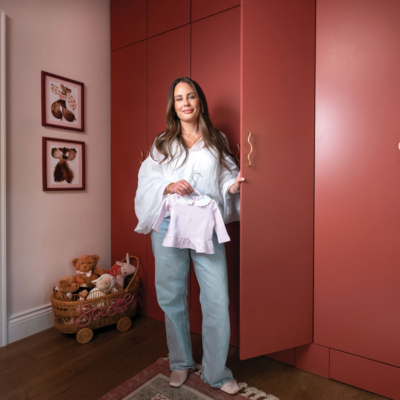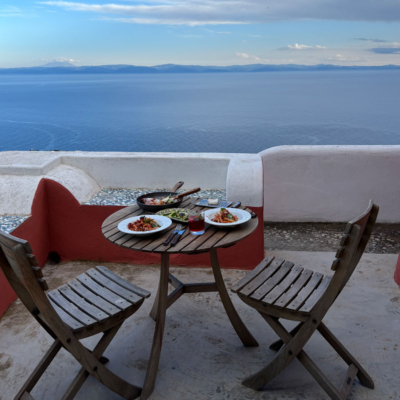Your at-home consultation with consultant dermatologist Dr Nikki Ralph …
We’re bringing the experts to you, with their advice for your best skincare at home. Dr Ralph talks us through the best ways to keep our skin healthy, from what to eat to what sunscreens to wear, and recommends products, many at €15 and under, that can help. Here’s your comprehensive expert guide to your best skin for summer and beyond …

1 DOUBLE CLEANSE – HERE’S HOW …
“I advise double cleansing for the deepest cleanse of your skin each evening. This is suitable for both oily/dry skin and for those with mature skin once you choose suitable products for your skin’s needs. Double cleansing is best to remove make-up and SPF, some of which are oil-based, and the sweat, dirt and debris that has built up on the skin over the day. I start with a micellar water, something hydrating and gentle enough to leave the skin feeling clean and fresh, without disrupting its delicate balance. [Try Holos Super Natural Activity Botanical Micellar Pre-Cleanse, €33, www.holos.ie). The second cleanse is with a water-based cream cleanser which I would suggest removing with a damp cotton pad to allow for emulsification of product on the skin, aiding with deeper cleansing of the pores to remove impurities. Something like La Roche-Posay’s Toleriane cleanser (€15.95) is suitable for those with even the most sensitive skin including dermatitis/hyper-reactive skin and rosacea, both of which are very common conditions in Ireland. For those with very oily/acne-prone skin they may prefer a gel-based cleanser such as the La Roche-Posay Effaclar Purifying Cleansing Gel (€14.95), which contains zinc to help regulate sebum production and leaves the skin feeling extra clean.”
2 EXFOLIATION: GENTLY DOES IT
“I prefer daily exfoliation with chemical exfoliants rather than physical exfoliants which tend to contain microbeads, which may damage the fragile skin of the face due to too much friction when rubbing on the product, not to mention they are bad for the environment. If one has very sensitive skin and suffers with conditions such as eczema and rosacea, you must introduce exfoliation very slowly and only when skin condition is under control with physician-guided treatment, otherwise it may result in a flare of their skin condition. I choose P50 by Biologique Recherche (from €60) which is a cult product; it’s essentially an alpha hydroxy acid blend containing lactic acid, salicyclic acid and niacin, which has fantastic anti-inflammatory properties and anti-acne properties. La Roche-Posay’s Effaclar Clarifying Lotion (€14.94) is specifically formulated for sensitive skin. You get the benefits of micro-exfoliant LHA (Lipo-Hydroxy Acid) and salicylic acid for exfoliation, but also hydrating ingredients such as glycerin and thermal water to protect against irritation. For frequency, those with normal skin could use this once a week (three times a week for t-zone area) and those with oily skin could use as a daily exfoliant.”

3 ON THE SPOT: YOUR SKIN-CLEARING REGIME
“Never squeeze spots! Squeezing or picking the skin may result in scarring and should the spot burst it will release its contents – a mixture of oil/sebum, dead skin cells and bacteria – which will spill onto the surrounding skin potentially leading to further breakouts in the days following… Also never use occlusive products such as barrier creams, which we’ve all tried at some time in our lives, so step away from the toothpaste and nappy creams! This may result in blockage of the surrounding pores, leading to further spot formation and breakouts. Spots will resolve of their own accord once you stick to your daily routine of nightly double cleansing, including addition of an exfoliant, and the daily morning use of moisturiser and SPF which is suitable for either oily or dry skin. Avoid oil-based make-up and choose mattifying zinc-based physical sunscreens which are suitable for acne and rosacea-prone skin.
Spot treatments, whether creams, sticks or stickers, placed directly onto the spot may dry the spot out more resulting in flaking of the skin but they do not tend to make it resolve any more quickly than if the skin was left to heal by itself. Adding a weekly mask such as Biologique Recherche Masque Vivant (€53), particularly to the T-zone, can rapidly bring a break-out under control. I am seeing increasing numbers of people, including myself, in recent weeks with tiny spots around the mouth and across the nose and lower cheeks, likely due to the occlusive effect of wearing a face mask all day. Therefore I’m now adding a clarifying mask twice weekly to purify and balance my skin during this difficult time. Effaclar Clay Mask from La Roche-Posay (€15) is a great pharmacy option and a go-to for sensitive skin: it gently unclogs pores, controls shine and cleanses impurities, without over-drying the skin.”
4 SKIN FOOD: EAT YOUR WAY TO GOOD SKIN
“I advise a balanced diet full of lean protein, fruit and vegetables as the skin needs vitamins and protein to heal and repair itself. When people adopt a very restrictive diet, removing complete food groups, they sometimes notice breakouts due to the fact their diet is now deficient in essential nutrients. Fat has been demonised by the food industry for years, yet fat is a very important part of our diet to maintain healthy skin and hair – therefore everything in moderation. So I don’t advise excessive saturated fats, however in order to maintain glowing skin and shiny hair you need to consume healthy fats which contain essential fatty acids and also allow us to absorb vitamins from our diet, as Vitamins A, D, E and K are all fat-soluble vitamins. It is also important to note that for people with acne prone skin they should avoid excessive dairy consumption and also avoid a high GI diet which may contribute to flares of their acne; but isn’t the actual cause of their acne.”
5 ALWAYS THE SUN: WE NEED TO TALK ABOUT UV
“The most common mistake we make with SPF is thinking that we don’t need it in Ireland unless it is very hot outside (25+ degrees). UVA and UVB are the main UV rays which cause damage to our skin as the majority of UVC is absorbed as it reaches the earth’s surface. UVA is present in Ireland all year round – therefore it is vital to protect one’s skin from UVA which is the primary cause of skin ageing and also contributes to skin cancer formation. UVB, which results in sunburn and also skin cancer formation, is highest in Ireland from approximately May-October. I choose a broad-spectrum physical sunscreen which acts as a “shield” for the skin, preventing penetration of the damaging UV rays into the epidermis and dermis. Physical sunscreens tend to contain less chemicals and contain zinc or titanium dioxide, which is suitable for those with sensitive skin conditions such as eczema, rosacea and for those on treatment for acne which makes their skin more UV sensitive. La Roche-Posay just launched Mineral One SPF50+, a daily make-up containing a 100 per cent mineral filter, with titanium dioxide for broad spectrum UVA and UVB protection (€21). It’s a hybrid foundation packed with mineral pigments, vitamin E for protection against photo pollution and added hyaluronic acid for hydration.”

6 YOUR SKIN’S ENEMIES
This is mainly extrinsic ageing, which is “what you do to your skin” – exposure to UV radiation which causes DNA damage, wrinkles, irregular pigmentation of the skin, weakened blood vessels etc. Pollution which results in skin ageing, breakouts/acne and dehydration of the skin making it appear more tired and worn; excessive alcohol consumption also leads to dehydration of the skin resulting in more obvious fine lines and wrinkling of the skin; smoking which can result in uneven skin tone as smoking affects blood vessels in the body including the skin which will be evident especially on the fragile skin of the face. It also contributes to more wrinkle formation especially around the mouth.
Other enemies include products which are not suitable for your skin. Therefore using harsh cleanser and toners which contain alcohol, fragrances, chemicals and preservatives such as parabens etc may result in skin sensitivity: redness, dry skin, flaking of the skin and intolerance of application of moisturisers, make-up and so on. So it is vital to choose products that suit your skin, and when new products are being introduced, ideally introduce them slowly, especially if you have sensitive skin. A go-to product range for patients with hyper-reactive or sensitive skin especially during a flare of their skin condition is La Roche-Posay Toleriane Ultra. Pure Vitamin C10 serum (€38) is also suitable for those with the most sensitive of skin. Vitamin C is renowned for its anti-oxidant properties and aiding the skin in protection against pollution and free radicals, but it can sometimes cause irritation. This one includes 10 per cent pure Vitamin C but is also buffered with hyaluronic acid for hydration and Neurosensine which calms inflammation.”
7 QUICK FIXES
At the moment, some of us have more time on our hands to take care of our skin and to develop an effective daily skin care routine. It shouldn’t take more than five minutes in the morning and five in the evening to have a simple, yet effective routine to maintain one’s glow. Using a weekly face mask is the only extra 15 minutes one requires to boost the skin of the face/neck and décolletage. I would encourage people to focus on not only their face but also to include the neck and décolletage, which we all forget when in a hurry to just take off make-up and go to sleep. The biggest giveaway of one’s age is actually the neck and back of the hands as so often we use SPF on our face but forget other areas, resulting in more UV damage over a lifetime.
I would suggest a once or twice weekly facial masque. My favourites are Masque Vivant and Crème Masque Vernix from Biologique Recherche: Masque Vivant (€53) is both a purifying and balancing masque which is ideal for a variety of skin conditions, not only acne, so it tightens and brightens, but also evens skin tone and reduces pore size over time. It is also great for the T-zone area for those with excessive oil/sebum production in this area. The only drawback is you have to get used to the Vegemite/Marmite smell. Cream Masque Vernix (€145) is a two in one product which may be used as a cream or a mask for those in need of extra hydration. It is rich in lipids, proteins and anti-oxidant peptides and reduces trans-epidermal water loss, repairs DNA damage caused by UV exposure and minimises the effect of ageing.”
8 YOUR SINGLE BEST SKIN BUY, RIGHT NOW
“This would have to be sunscreen, sunscreen, sunscreen…. Now we are in May, the first month of summer and also Melanoma Awareness Month. May through to October is when the damaging UVB rays are at their strongest in Ireland, therefore we are most at risk of damage. Despite the many, many downsides of Covid-19, one of the upsides is that our weather has been steadily improving and people have had more time for localised, outdoor activity such as walking or spending time in their gardens. Therefore, now that people have more daytime hours to spend outdoors it is vital everyone starts wearing a good quality broad-spectrum sunscreen on all sun-exposed sites, to prevent against skin ageing and also skin cancer formation in the long run. Children are particularly vulnerable as they may spend many hours playing outside. Therefore, they should have sunscreen applied generously every two hours – and also small babies under six months should be in the shade as sunscreen is not designed for children six months and younger.”
9 THE THING ABOUT SKIN …
“The most important thing I’ve learned so far is the skin being the largest organ in the body, which never ceases to amaze me. There are over 3,000 skin conditions, most of which I will not see in my lifetime. Being a dermatologist can sometimes be a bit like being a detective trying to solve a mystery. Skin is often taken for granted by people who feel “it’s just skin” but it in fact it may be the mirror to our soul and often clues on the skin can lead to a diagnosis of an internal skin disease which, once treated, may resolve the skin condition. I have also learned to never underestimate how much impact one’s skin can have on people’s life choices, their mood and ultimately their quality of life. In fact chronic skin disease has one of the biggest impacts on a person’s quality of life as it is so visible to the person and to others. For me, there is nothing more satisfying as a dermatologist as being able to see someone unfortunately suffering with their skin, often for years, and being able to help improve that condition so much that the person can resume a more rewarding and fulfilling life.”
10 ONE TREATMENT TO BOOK FOR WHEN THIS IS ALL OVER
“For me this will be PRP, also known as Platelet Rich Plasma Therapy. Over the last few weeks and likely to continue for many weeks to months more, I have been and will continue to wear a facial mask and a complete face and neck visor. This is quite uncomfortable at times but absolutely vital for the protection of my patients and myself. This has resulted in more skin dehydration and tiny occlusive acne-like lesions of the central face. PRP helps to promote collagen production and kickstarts the skin’s regenerative capabilities. Growth factors in the plasma increase collagen and elastin production and stem cell proliferation and vascular formation. It can treat such a wide range of concerns, including fine lines and wrinkles, ageing and sagging skin especially of the fine skin around the eyes, to improve the “crepiness” of the skin. It also improves acne scars, and can be used on the neck, hands and décolletage. Maybe it is the fact that I wash my hands 100 times a day and also do many, many video consultations which has highlighted my fine lines and wrinkles and dehydration of both my facial skin and the skin on my hands, but it will certainly be my go-to treatment once we come through this surreal and difficult time we are living through right now.”
La Roche Posay is available online from local Irish pharmacies, including meagherspharmacy.ie, mccabespharmacy.com and chtralee.com.. Biologique Recherche is available at www.instituteofdermatologists.ie, The Merrion Spa and www.skinbyolga.ie.
LOVETHEGLOSS.IE?
Sign up to our MAILING LIST now for a roundup of the latest fashion, beauty, interiors and entertaining news from THE GLOSS MAGAZINE’s daily dispatches.










